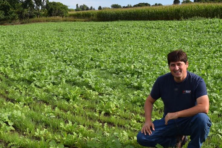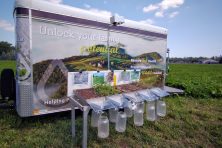Programs Funded to Benefit Farmers, Groundwater and Soil
- Share
- Tweet
- Pin
- Share

Two new programs intended to help farmers improve water quality and soil health were funded last week.
First, $1.6 million went to the Commercial Nitrogen Optimization Pilot Program, which allows farmers to apply for grants of up to $50,000 to work with the University of Wisconsin System to try new measures to increase the use of applied nitrates, reduce nitrate leaching and monitor the results.
Another $800,000 was approved to provide farmers with a $5-per-acre rebate on their crop-insurance premiums if they plant cover crops and have not received funding for cover crops from other state or federal programs.
The Wisconsin Joint Committee on Finance unanimously approved the request last week, 14-0, from the Department of Agriculture, Trade and Consumer Protection (DATCP) to fund the two programs, which are part of Wisconsin Act 223, created earlier this year. The act addresses the issue of nitrate leaching into groundwater, with the opportunity to result in other benefits such as improved surface-water quality, soil health and agricultural yields in the short and long term.
Rep. Joel Kitchens (R-Sturgeon Bay) and Sen. Robert Cowles (R-Green Bay) authored the bill.
“Since I was first elected to the Assembly in 2014, my philosophy in dealing with complex environmental issues has always involved bringing both conservation and agriculture groups together to find common interests and work on a compromise,” Kitchens said. “It is vital to the future of our state that we preserve our natural resources, while also protecting our farm economy.”
Along with the two new programs at DATCP, Act 223 also required the UW’s Geological and Natural History Survey to create one new hydrogeologist project position for a period of three years to assist localities with increasing their knowledge of local natural features. This position opened for recruitment Aug. 4, with a goal of having it filled in September.


